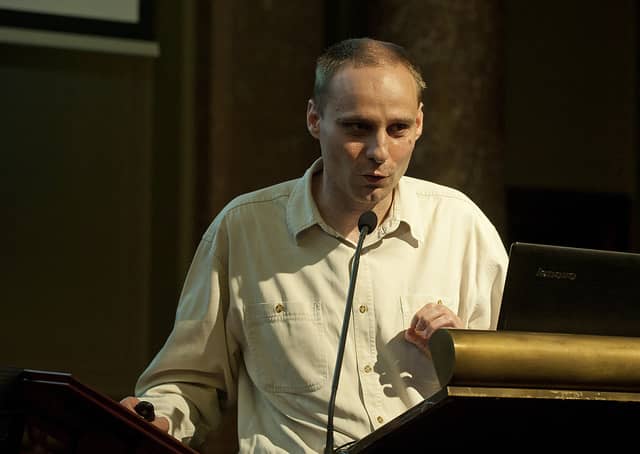How did you get interested in chemistry? Why is this field fascinating to you?
I grew up as the elder son of two physicians. In my parents’ apartment, there were a lot of books around, some of which were old textbooks of their medical training. This included a title on chemistry which was particularly fascinating to me: I read most of it at the age of 10. Soon after that I also read the novel titled ‘Mysterious Island’ by Jules Verne. Now I know that this latter was intended to be a story on chemistry and chemical engineering by the author, and some of my present-day colleagues also say the origins of their enthusiasm toward this science leads back to the teenage experience of reading this book. My primary school was fortunate enough to provide me with extracurricular chemistry classes even at an early age when the subject was not compulsory. I was very successful at national chemistry competitions, and I was also on the Hungarian team for the 1992 International Chemistry Olympiad, which was organized in the United States. I won a silver medal there. So, these highly positive developments paved my career path toward being a researcher in chemistry.
You have spent more years abroad as a researcher. How did it affect your professional life? Did it have an impact on your general worldview?
Overall, I spent two years in the United States as a visiting researcher and about one and a half months in the United Kingdom. In the United States, I was working in a national laboratory of the Department of Energy (Ames Lab), which is operated by Iowa State University in Ames, and I was a Fulbright scholar in my second year. There I understood the enormous value of researcher exchange programs. I was exposed to both the intense academic life of one of the world’s largest education systems and to the culture of federal research institutes. That experience and the opportunities that I became aware of at this time steered my academic path in a direction that I would never have thought of following otherwise. I understood that even among scientists working on cutting-edge research, one of the most important values is independent thinking. During these visits, I also had an opportunity to live in a multicultural society and meet people from all over the world. My cultural tolerance increased greatly, and I could also adopt methods of communication that are more flexible and are of great value for me today when I teach students from a large variety of countries and with very diverse cultural backgrounds.
Beyond being an internationally acclaimed researcher, you put a lot of work into bringing chemistry closer to a non-professional audience too. Why is it important to you to educate those who are not experts in the field of chemistry?
For chemists, the usefulness of their science to society is self-explanatory. This is probably why most of my colleagues do not think it is necessary to show this obvious thing to the world. However, my realization is that even if humankind benefits greatly from the results of chemical sciences, this fact must be explained to society because science must rely on continuous public support. The most innovative new scientific results in the world are reached without the pressing presence of direct financial interests. To keep receiving public funding, the spectacular results and the huge benefits must be made clear to the taxpayers. In some other scientific disciplines, there is a much higher awareness of this fact. For example, astronomy research receives a lot of public support, which is quite surprising at first sight because new observations and theories on far-away stars and galaxies have a less obvious impact on human lives than most of the results of modern chemical research. I trace the enormous public success of astronomy back to the late Carl Sagan, who understood the value of the promotion of science and recognized the fact spectacular pictures are necessary for these efforts. I think chemists should learn from this example and engage more deeply in science popularization efforts.

What are you currently working on as a researcher?
My field of research is called mathematical reaction kinetics. Reaction kinetics investigates how chemical reactions occur in time. There are vast differences: some processes occur well within the blink of an eye; some others may take centuries or even geological ages. In this field of chemistry, the amounts of various substances present are typically described mathematically as a function of time and the experimental results often give equations for these functions, these need to be solved. My main field of research is finding the solutions to these mathematical equations for functions. One of the recent projects I have been involved in did this in a reaction when so-called nanoparticles are prepared, which are emerging new types of materials used as essential additives in many industrial and pharmaceutical processes.